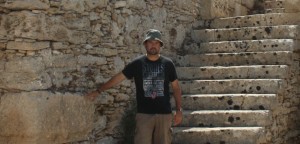BS Geografía e Historia, Universidad Autónoma de Madrid 1998
MS Archaeology, Universidad Autónoma de Madrid 2001
PhD Archaeology, Universidad Autónoma de Madrid 2005
1998-2002 Professional archaeologist
2002-2005 pre-doctoral fellow (Universidad Autónoma de Madrid)
2006-2008 post-doctoral fellow (Université de Toulouse)
2008-2009 Researcher (Universitat Pompeu Fabra de Barcelona)
2009-2012 Lecturer in Archaeology and Juan de la Cierva Research Program (Universidad de Alicante)
2012-2017 Lecturer in Archaelogy and Ramón y Cajal Research Program (Universidad de Alicante)
2017- Lecturer in Archaeology (Universidad de Alicante)
Research Stays
2001 Research Fellow. Institut National du Patrimoine (Tunis)
2002 Research-Fellow. ISCIMA-CNR Roma (Italy)
2003 Research Fellow. Université March Bloch. Strasbourg II (France)
2004 Research Fellow. Université de Provence. Aix en Provence (France)
2015 Academic Visitor. Faculty of Classics. University of Oxford (UK)
2016 Academic Visitor. Deutsches Archäologisches Institut, Berlin (Germany)

The main research line carried out so far is part of the studies on Punic culture and its influence on native Iberian societies with a particular interest in the complex processes of hybridization derived from that influence which can be inferred in funerary architecture. The relations between both societies, Punic and Iberian, have traditionally been interpreted from a theoretical standpoint premised on the so-called acculturation which segregates cultures into ‘advanced’ and ‘backward’. However, the topic is nowadays approached from a wider perspective which takes into account both the bidirectional dialectics established in cross-cultural contacts and the resulting ‘polyhedric’ reality. All these ideas draw on a panorama of theoretical renewal concerning Archaeology, with examples such as the so-called ‘postcolonial’ studies which in the Spanish context have already had a positive effect in the materialization of new analytical models for cultural contacts between Phoenicians, Punics, or Romans and Iberian societies.
The knowledge of Punic culture is thus considered today a key to understand many historical processes within Iberian societies, especially after the 3rd century B.C. In recent years, indeed, many new archaeological studies concerning cultural contacts and the construction of social identities in Iberia have revealed the importance of a better understanding of Mediterranean cultures such as the Punic.
Deja un comentario